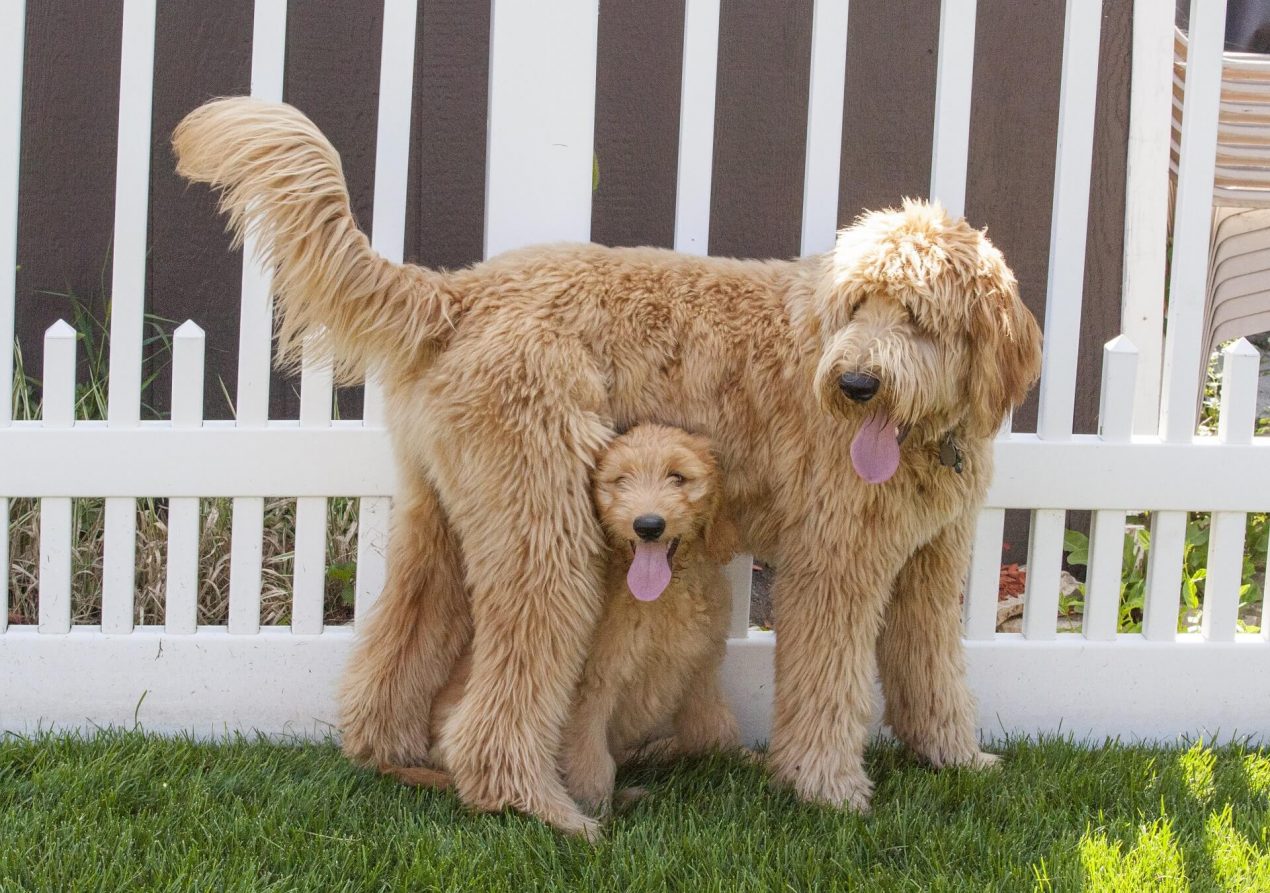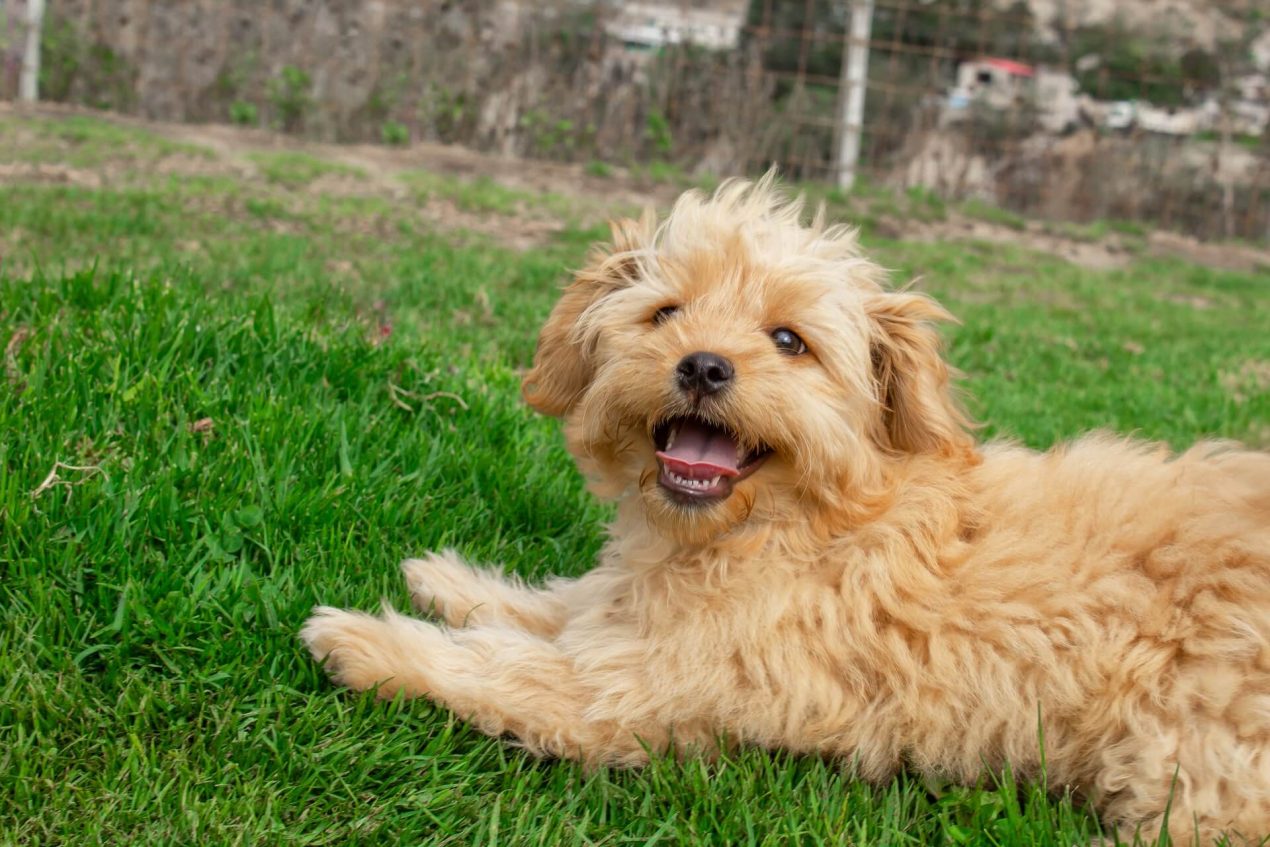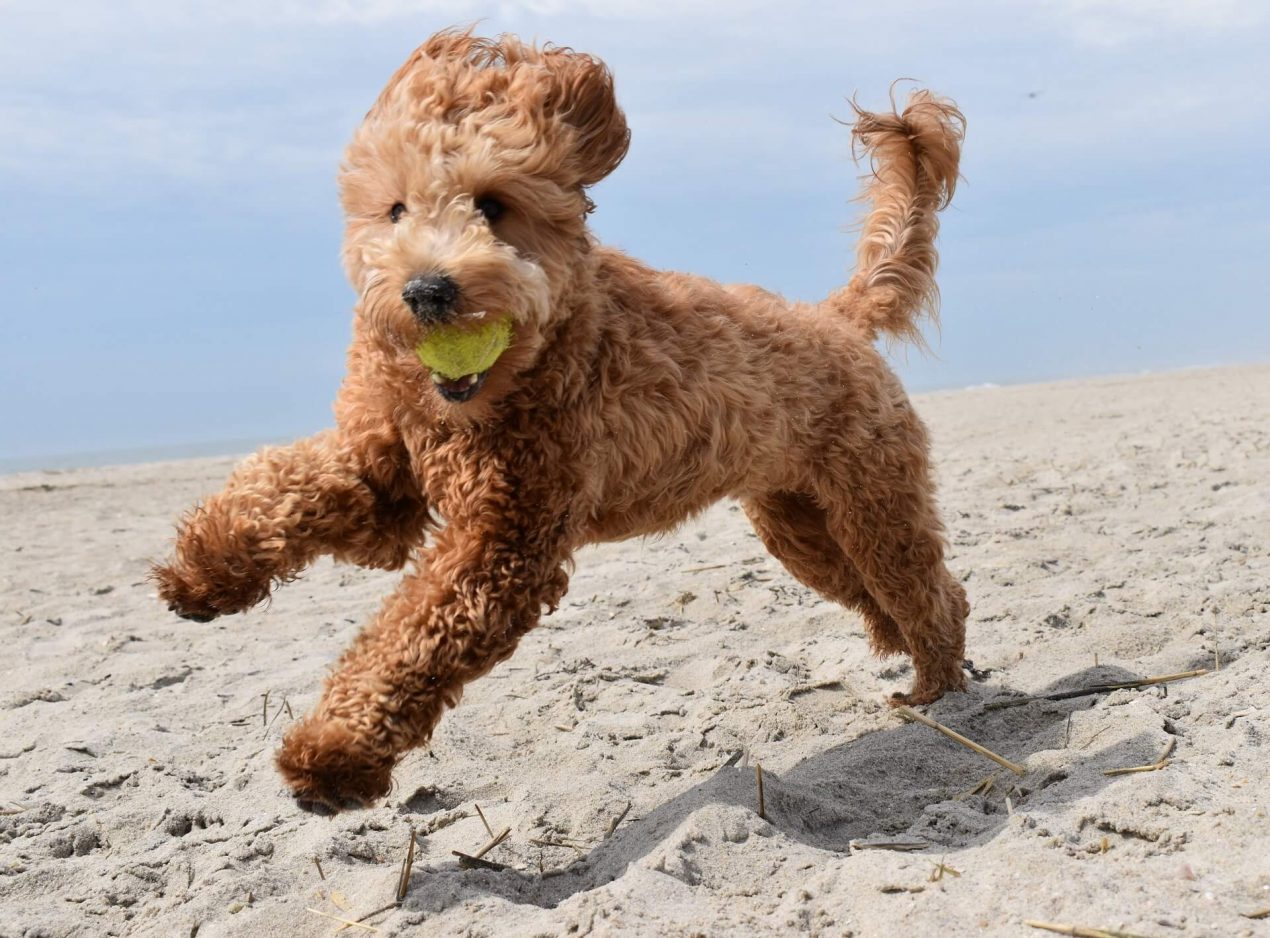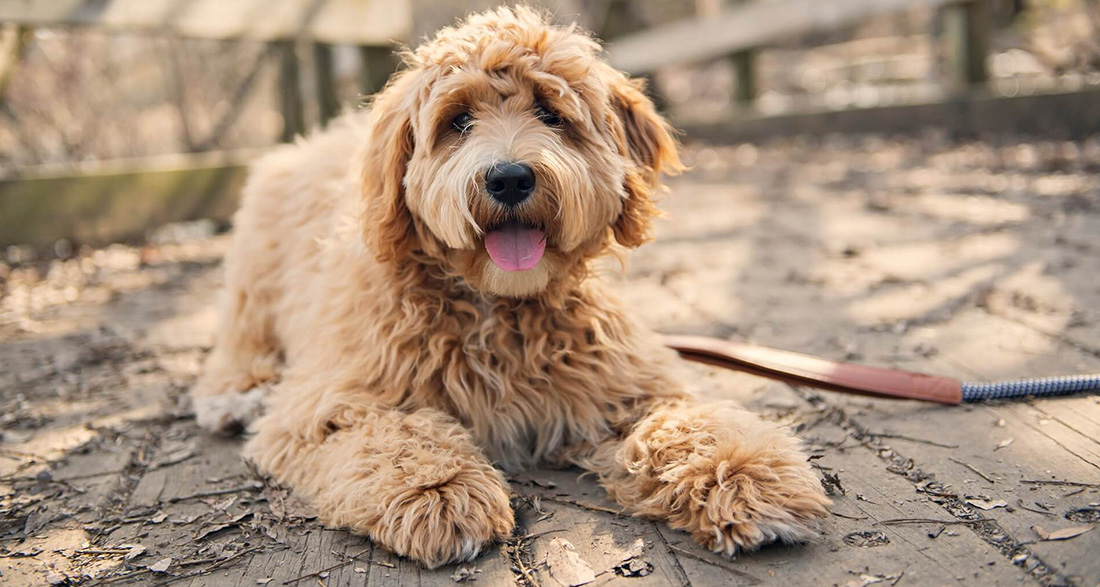The Goldendoodle is a versatile breed that can integrate into both family life and professional environments. Additionally, this friendly mixed breed can be a great companion for sports activities. It’s no wonder that the Goldendoodle ranks among the most popular hybrids!
History of the “Goldendoodle”
The Goldendoodle is a crossbreed of purebred Poodles and Golden Retrievers. Both breeds share character traits (e.g., intelligence, friendliness) and physical characteristics (e.g., body structure), which contribute to the successful blend.
The American creators of the Goldendoodle aimed for this harmonious outcome when they began planned breeding in the 1990s. They joined a current trend focused on breeding novel hybrids (so-called designer dogs). The Goldendoodle was one of the most popular mixed breeds, partly due to its hypoallergenic qualities, and is now found all over the world.
Breed Overview
GROUP: Hybrid
HEIGHT: 13 to 26 inches
WEIGHT: Typically 45 to 100 pounds, but can weigh as little as 15 to 30 pounds
COAT: Wiry, curlier hair or shaggier, straight fur
COAT COLOR: Gold, cream, red, black, brown, white, gray, or a combination
LIFE SPAN: 10 to 15 years
TEMPERAMENT: Friendly, intelligent, energetic, trainable
HYPOALLERGENIC: Yes
ORIGIN: United States
Nature and Character
As the Goldendoodle is a mixed breed without its own breed standard, it’s only partially possible to predict the dog’s character in advance. Predictability ends at the latest in the second generation (Goldendoodle + Goldendoodle).

When purebred Golden Retrievers are crossed with purebred Poodles (first-generation Goldendoodle), it’s expected that the Goldendoodle will inherit some of the traits of both parents. These include:
Family suitability: Goldendoodles are strongly attached to people. Due to their calm nature, they get along well with both adults and their children.
Performance: The Goldendoodle is enduring and smart. Therefore, activities that combine cognitive and physical components are particularly enjoyable for them.
Sociability: This friendly mixed breed dog is very social in interactions with its fellow dogs. Additionally, it is reputed to get along well with other animals.
| Affection Level | High |
| Friendliness | High |
| Kid-Friendly | High |
| Pet-Friendly | High |
| Exercise Needs | Medium |
| Playfulness | High |
| Energy Level | High |
| Trainability | High |
| Intelligence | High |
| Tendency to Bark | Low |
| Amount of Shedding | Low |
Acquiring a “Goldendoodle”
The Goldendoodle is a mix of breeds. This has the advantage that the relatives of the Goldendoodle (the Golden Retriever and the Poodle) are possible alternatives since the dogs have a similar character and appearance. If you’re not set on specific expectations for your future dog, this also gives you the chance to avoid long waiting times and long distances. Additionally, the likelihood of finding your dream dog in one of the numerous animal shelters increases. However, the rescue dogs are likely to be already adults.
What should I consider when purchasing?
As the Goldendoodle is not a purebred but a mixed breed, the dogs vary greatly, and reputable breeders are scarce.
Nevertheless, you can find your desired dog by paying attention to the following criteria:
- The breeder should minimize the risk of hereditary diseases by having the health of the breeding animals checked in advance. Inquire whether they can provide evidence of health precautions.
- It’s also important that they document the litter history photographically and in writing (e.g., regarding the weight gain of each puppy).
- Reputable breeders offer a personal introduction within the breeding facility and introduce not only the puppies but also the mother dog to potential buyers.
- Check the pedigree to ensure there are no duplicate entries (i.e., no high inbreeding rate).
- The seller should be available for questions both during and after the purchase.
- Conscientious breeders ensure that their dogs go to suitable homes by asking targeted questions to potential buyers.
- Avoid purchasing online.
Development and Training of the Puppy
In the Goldendoodle, the prerequisites for good learning are already firmly established. Although training is typically straightforward, the eager-to-learn hybrid needs a owner who takes on the leadership role. In most cases, the Goldendoodle willingly accepts the hierarchical role distribution. Because he strives to please his human, he is also a great beginner dog. In the hands of an ambitious dog owner, the Goldendoodle can even be trained to exhibit the qualities of a service dog. Possible training fields include work as a therapy or guide dog for the blind.

How do I care for a “Goldendoodle”?
For active dog owners, the Goldendoodle can be a great companion. After all, he loves movement and spending time together. The mix is a dog that simply isn’t satisfied with a monotonous daily routine. Therefore, waiting for his owner’s return can be problematic for the Goldendoodle. It would be better for the Goldendoodle if his caregiver integrates him into their daily tasks. The hybrid is a dog that has difficulty coping without his family.
His desire for bonding is exceptionally strong. This includes seeking contact not only with adults but also with children or cats. Nevertheless, especially in a multi-person household, he should have a quiet place where he can retreat if necessary.
The Goldendoodle feels comfortable wherever all these components are provided. This can be in the countryside as well as in densely populated residential areas.
Activities with the “Goldendoodle”
The Goldendoodle is a lively dog who can hold his own in numerous disciplines (such as agility or dog dancing).
Due to his hunting dog past, he also loves all activities where he can express his hunting instinct within a regulated framework (dummy training, retrieving, etc.).
The Goldendoodle is known to be a water lover. Trips to the water can therefore be a welcome change. Goldendoodles are enduring and love to swim. An extensive walk along a wild body of water is optimal from the dog’s perspective.
Since the Goldendoodle is very intelligent, he can use intelligence toys and is quite adept at learning new things. Due to his quick understanding, the Goldendoodle also works as a versatile working dog.
It is always important that the activities correspond to the physical development of the dog.
Health and Grooming
The Goldendoodle is generally a very healthy animal because it is assumed to combine the best physical characteristics of both parent breeds (known as the heterosis effect). However, this is only the case with healthy breeding animals. Therefore, you should choose a Goldendoodle from a breeder who can provide evidence of health examinations and their results.
For Golden Retrievers and Poodles, this primarily includes the exclusion of:
- Eye diseases,
- Elbow and
- Hip dysplasia.
The grooming needs depend on the type of coat. Some Goldendoodles do not shed, which means their coat should be manually trimmed and brushed once a week to prevent it from becoming stringy and easily tangled.

Feeding the friendly family dog should be age-appropriate and based on the weight, daily activity level, and any Doodle-specific intolerances. There are no special requirements for the composition of the diet. Since some Golden Retrievers are prone to obesity, this also applies to some of their offspring. If unhealthy weight gain is observed in your Goldendoodle, it is recommended to reduce the size of food portions or the amount of treats.
In addition, this grooming routine awaits you:
- Removing hair from the eye area
- Checking teeth
- Cleaning ears
- Trimming claws
- Annual vaccinations
- Parasite protection
Interesting and Worth Knowing
Key points about the Goldendoodle:
- The Goldendoodle is a so-called designer dog. This means that it is produced in the subsequent generation from the mating of two different breeds of dogs.
- The name “Goldendoodle” is composed of the breed names of its ancestors (Golden Retriever and Poodle).
- The Poodle is a hypoallergenic dog because it does not undergo shedding and therefore hardly sheds at all. This trait is sometimes inherited by its offspring, the Goldendoodles. However, there is no guarantee that Goldendoodles will also be hypoallergenic.
Do you have a Goldendoodle or are you considering getting one? Tell me in the comments what you think makes them so special!


